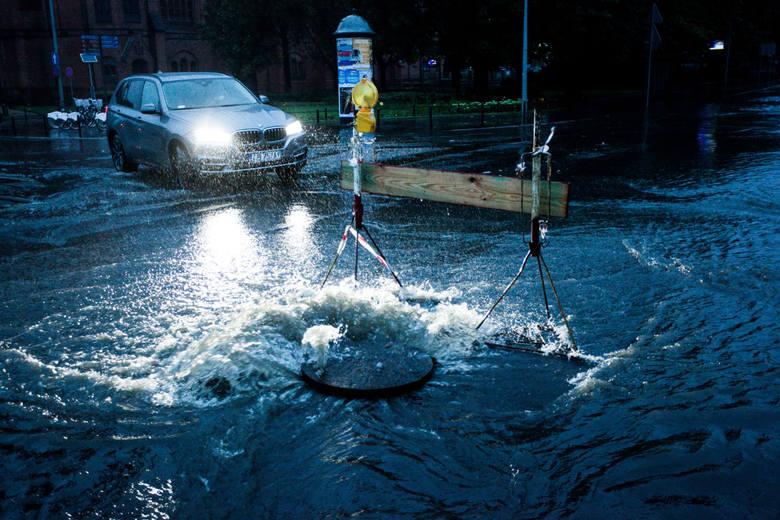Last updated: October 2021
The city of Bydgoszcz modernizes the rain drainage system with the support of EU funds. The current badly functioning rain drainage system (with sanded and littered canals) prevents from unobstructed rainwater flow to the Brda and Vistula Rivers or the Bydgoszcz Canal. This in turn leads to frequent floods in the city. The project is planned for the period between 2017 and 2021 and involves water purification and management of rainwater in the grey and green urban areas as well as reuse of the collected water for watering urban greenery [1,2].
Overview
Nature-based solution
- Blue infrastructure
- Rivers/streams/canals/estuaries
- Green areas for water management
- Sustainable urban drainage systems
Key challenges
- Water management (SDG 6)
- Flood protection
- Stormwater and rainfall management and storage
- Improvements to water quality
- Regeneration, land-use and urban development
- Regulation of built environment
Focus
Strategy, plan or policy development, Management and improved protection of rivers and other blue areas
Project objectives
1) Solving the problem of the frequent flooding which is caused by the malfunctioning of rain drainage system;
2) Improving the comfort of living of the residents of Bydgoszcz;
3) Better protection of the roads, tram tracks, communication lines and buildings from water damage; 4) Water retention and provision of rain water for watering urban greenery [1,2].
Implementation activities
1) Thorough renovation, reconstruction, and cleaning of over 90 km of existing canals;
2) Construction of about 14 km of new drains for rain;
3) Building several dozen retention tanks with capacities from 26 to 1800 cubic meters, including reservoirs with the possibility of reusing water for watering urban greenery;
4) Creating 22 storm water purification plants [1,2].
Main beneficiaries
- Local government/Municipality
- Citizens or community groups
Governance
Management set-up
- Government-led
Type of initiating organisation
- Local government/municipality
Participatory approaches/ community involvement
- Unknown
Details on the roles of the organisations involved in the project
Municipal Waterworks and Sewage System in Bydgoszcz sp. Z o.o. (Miejskie Wodociągi i Kanalizacja w Bydgoszczy sp. z o.o.) have prepared a program of modernization of rain drainage system "Construction and reconstruction of rain drainage system and adjustment of rain drainage network to climate change in the city of Bydgoszcz", which was accepted by the Ministry of Environment and received relevant EU funding [1,2].
Project implemented in response to ...
... an EU policy or strategy?
Unknown
... a national policy or strategy?
Unknown
... a local policy or strategy?
Yes
(Municipal Waterworks and Sewage System in Bydgoszcz sp. Z o.o. (Miejskie Wodociągi i Kanalizacja w Bydgoszczy sp. z o.o.) have prepared a program of modernization of rain drainage system called "Construction and reconstruction of rain drainage system and adjustment of rain drainage network to climate change in the city of Bydgoszcz", which was accepted by the Ministry of Environment.(1)(2)
)
Financing
Total cost
More than €4,000,000
Source(s) of funding
- EU funds
Type of funding
- Direct funding (grants, subsidies, or self-financed projects by private entities)
Non-financial contribution
Unknown
Impacts and Monitoring
Environmental impacts
- Climate change
- Strengthened capacity to address climate hazards/natural disasters
- Water management and blue areas
- Increased protection against flooding
- Improved stormwater management
Economic impacts
- Reduce financial cost for urban management
Socio-cultural impacts
- Unknown
Type of reported impacts
Expected impacts
Presence of formal monitoring system
Unknown
Presence of indicators used in reporting
No evidence in public records
Presence of monitoring/ evaluation reports
No evidence in public records
Availability of a web-based monitoring tool
No evidence in public records
References
1.Source link, (2017), ‘130 million co-financing for the modernization of rain drainage’ (‘130 mln zl dofinansowania na modernizację kanalizacji deszczowej’), Source link (Accessed: 17 September 2020).
2.Stasiewicz, A., (2016), (‘Bydgoszcz zrobi porządek z kanalizacją deszczową),
Source link (Accessed: 17 September 2020).
2.Stasiewicz, A., (2016), (‘Bydgoszcz zrobi porządek z kanalizacją deszczową),
Source link (Accessed: 17 September 2020).

